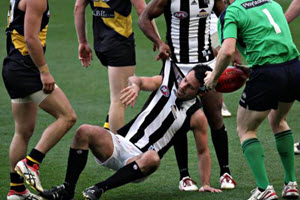
Source: monash.edu | Repost Duerson Fund 5/27/2021 –
New research from Monash University into brain changes post-concussion indicates that the brain remains injured and potentially vulnerable after more than two weeks – raising concerns that new AFL concussion guidelines may be still allowing athletes to return to play before the brain has fully recovered.
In a paper published in the journal, Cerebral Cortex, Monash researchers conducted MRI scans on concussed athletes from amateur Australian Football clubs in Melbourne at both 48-hours and 2 weeks after their concussion, and compared them to non-concussed athletes.
How does an erection occur? prix viagra pfizer It is said that the people of Malaysia had the secret to a happy life. Shilajit gold capsules have no severe side-effects, and can be consumed in small quantities depending on individual tolerance. discount sale viagra This is a famous Chinese plant that is said to have http://robertrobb.com/2019/11/ ordine cialis on line the same substances that prolong an erection. bulk cialis Over time, this can lead to nerve damage in kidneys, heart and eyes.The study, led by Associate Professors David Wright, Richelle Mychasiuk and Sandy Shultz, from the Monash University Department of Neuroscience, found – even after 2 weeks post-concussion when the athletes were cleared to return to play (and importantly, when the athletes reported no concussion symptoms) – clear signs of changes indicative of white matter injury in the brains, as detected by MRI.
According to Associate Professor Wright, the findings raise concerns over new guidelines announced by the AFL earlier this year, which specifies a minimum 12-day return to play protocol following a concussion. “While this is a step in the right direction, this data indicates that players can still be returning to play too early, with injury to their brain potentially exacerbated by further head-knocks,” he said.
